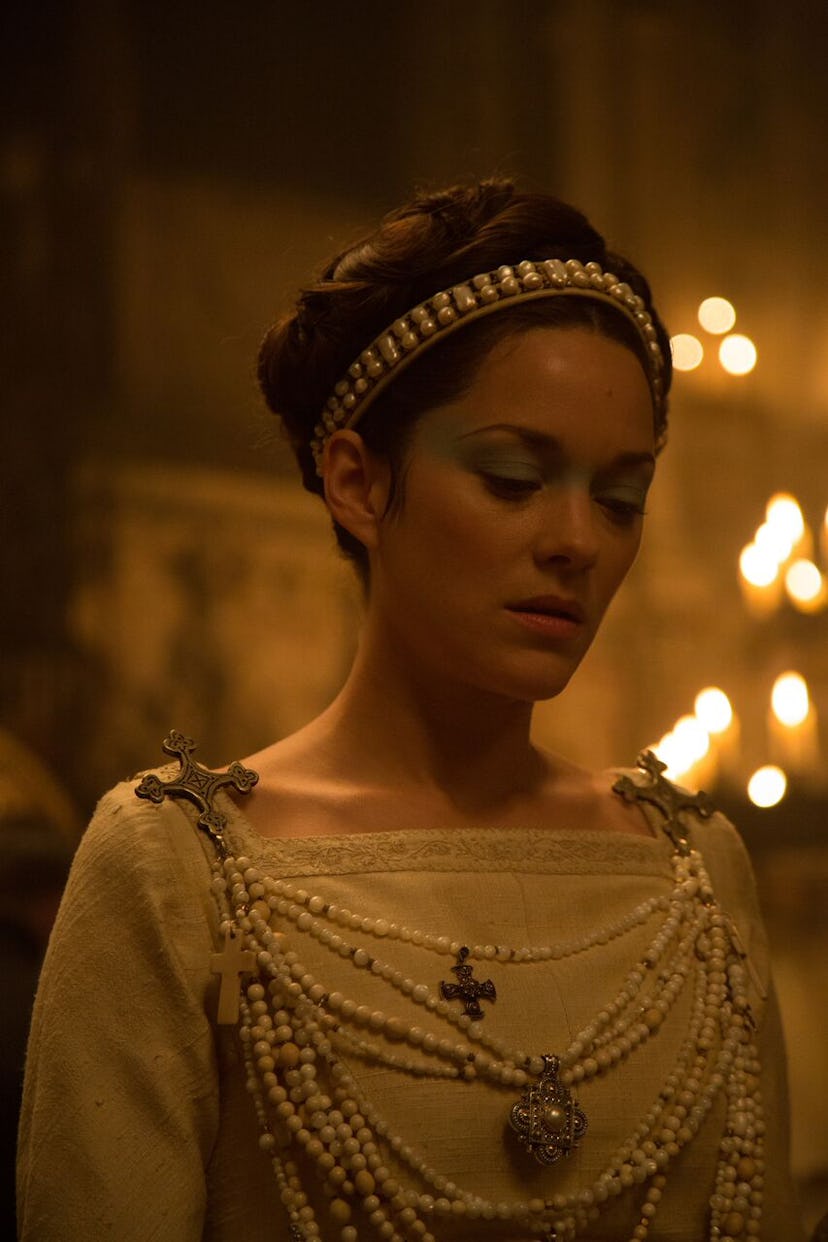Marion Cotillard Always Wanted to Play Lady Macbeth

French actress Marion Cotillard has played Edith Piaf in La Vie en Rose, a young wife and mother in Two Days, One Night—and this month she takes on the violent role of Lady Macbeth in Justin Kurzel’s new Macbeth adaptation. On the eve of the film’s North American release, Cotillard tells all about preparing for the role, finding humanity in her character, and acting opposite Michael Fassbender.
What drew you to this project? What made you want to get involved? I always knew that I would play Lady Macbeth at one point in my life, but I thought it would be on stage and in French and the opportunity to do Lady Macbeth in English was something that I could not miss. Then I talked to the director, Justin Kurzel, and his vision of the play, the story he wanted to tell I thought was really moving and really human and I immediately wanted to be a part of the project.
What was it like working with Justin Kurzel? He’s one of the greatest directors today, he’s someone I want to work with my whole life—we’re doing another movie together. He’s a real artist, he’s committed to his work, and it’s something that is really vital for him: to tell stories and to do movies. And that’s the kind of director I really want to work with—it has to be something they need to do, as I need to act. He’s someone who will find humanity in everything, every single thing, even a non living thing he will find humanity in there. He loves actors and the way he directs them is so intelligent, and the way he’s able to get feelings out of the actors is really, really strong. He’s deeply connected with the human soul and heart, and that’s what he’s interested in.
This is such an intense film and story—how did you prepare for the role? We had the chance to rehearse for a month and a half. It began with understanding every subtlety of the text because Shakespeare’s writing is very rich and you can have many interpretations of one sentence and a lot of meanings hidden meanings to what the characters say. Besides the technical work I had to do, working on the accent and the rhythm and finding the meaning of everything, we had kind of a theatrical rehearsal process with Justin and all the actors. We rehearsed the scenes, we explored different choices that we could make because of, again, the different interpretations and meanings that you could get out of the play. That was a very very interesting time and I felt very lucky to be able to attend such an amazing actor preparation. Working with Michael for month and a half before we started shooting and watching Justin directing other actors taught me a lot about acting. Having the opportunity to attend such an amazing actor like Michael’s preparation is really, really inspiring. We also worked with a Shakespeare expert who was also our dialect coach, Neil Swain, and he gave us the keys to understand all the subtleties and the meanings of the play.
Tell us about working with Michael Fassbender. Well, he has a very, very deep intelligence of acting, of the human soul. He’s very creative as well, but not only for him and his character—not only to make his character singular or special—his work is always connected to the energy of the story, of the director, and of the other actors. This generosity and creativity all together—and, of course, his huge talent—makes him one of the best actors and acting partners I’ve worked with.
What were some of your favorite things about playing Lady Macbeth? The struggle within her—this opposition of violence and humanity, of evilness and humanity that is eating her is very interesting to experience and I had never experienced such a dark character, which is not easy every day. But at the same time, to find humanity in a person who does monstrous things is very interesting, too, and to explore her fears and pain and to find the roots of her madness in the fact that she doesn’t face any of her issues, she just tries to escape and cover her fears with the illusion of power. The violence and the illusion that the power will bring her something good is very related to the way we live today, the way we don’t face our issues and that’s what creates madness.
Macbeth is, of course, said to be cursed… Did anything happen while filming that validated that? Nope! Nothing! [Laughs] No, nothing!
Did you expect the production to be cursed, going into the project? I didn’t, personally. I mean anybody didn’t, but I heard that when they were preparing the movie, like things started to happen so they changed the title to The Scottish Play and that fixed everything, so I don’t know… I’m not superstitious at all so I was fine with saying the “M” word and everything!
Are there any other Shakespeare plays you would like to bring to life or do you have a favorite work of his? Well at one point I thought that I would love to play Lady Macbeth on stage, but then I thought that it was maybe not a good idea… because the experience that I had with her was really intense and I think I’m done with it. I think my favorite is definitely Macbeth, but [other favorites are] Midsummer Night’s Dream, Twelfth Night, and Richard III. I mean almost all of his plays are masterpieces, so it would be hard to choose.